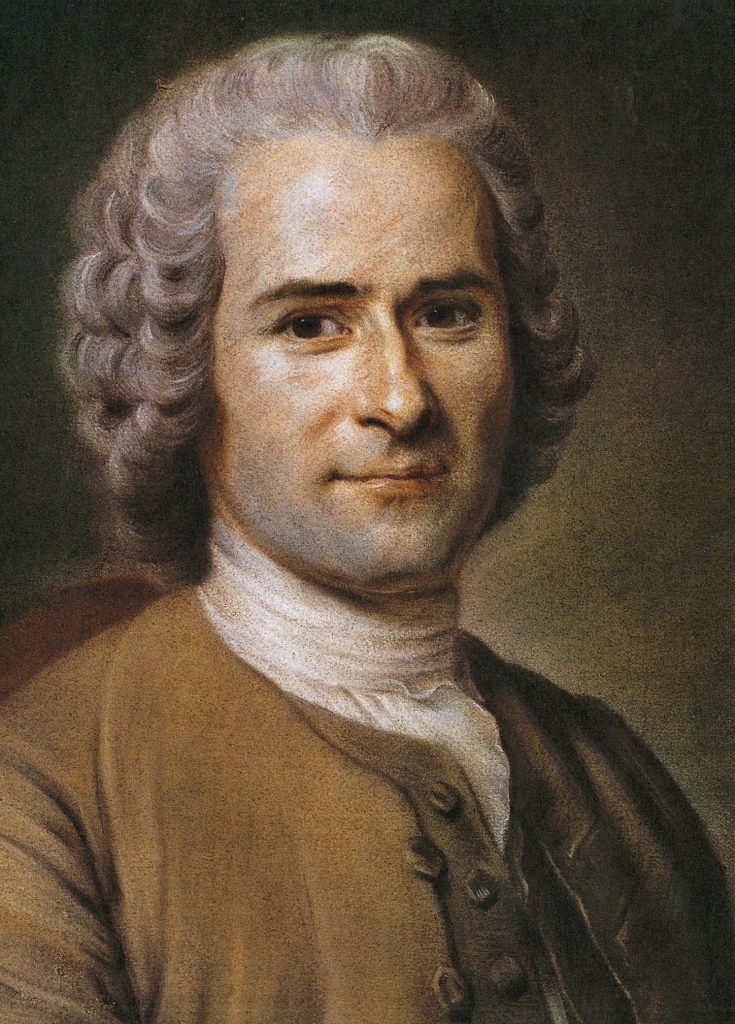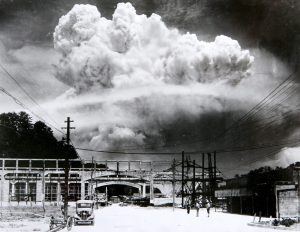“Man is born free and everywhere he is in chains.” -Jean-Jacques Rousseau1
Jean-Jacques Rousseau was born in the independent Calvinist city-state of Geneva on June 28, 1712. His mother, Suzanne Bernard, died exactly nine days after his birth, and as a result his father, Isaac Rousseau, was responsible for raising and educating Jean-Jacques, which he did until he was ten years old.2
When Rousseau was ten, his father fled Geneva to avoid imprisonment. Rousseau was left to live with his aunt and uncle. While living there, he acquired a passion for music from his aunt, but no one would have thought that he would ever be able to make a living from music; after all, he was the son of a watchmaker. By thirteen, Rousseau was sent to work as a notary, which did not last long, because again he was only seen as the son of a watchmaker.3 His only option was to work as a watchmaker, so he spent three years of his life there, which in his autobiography, Confessions, he describes as his “miserable years.”4 He spent the next twenty years of his life working in various menial jobs in order to make a living. But then in 1750, when he was thirty-seven years old, his life took a radical turn.
Rousseau wrote music for one of the operas that he composed, Le Devin du village (“The Village Soothsayer”).5 This opera was so successful that it caught the attention of King Louis XV. Many say that Rousseau could have lived an easy life thereafter, but his Calvinist blood would not let him live with that worldly glory.6 When Rousseau was thirty-seven, he had what he called a “terrible flash” (an illumination), that modern progress had corrupted people instead of improving them.7 So, he started writing his first important work, an essay called Discours sur les sciences et les arts, or Discourse on the Sciences and Arts, also known as his First Discourse; and he entered it in a contest at the Dijon Academy of Science in 1750, in which his essay won.8 He had already started writing articles for Diderot’s Encyclopedie, but his Discourse rejected the main idea of the Enlightenment, which was that technology and science would gradually make the world a better place for all of humanity. Rousseau argued that all advances of knowledge were harmful and would take men into further corruption.
Rousseau’s First Discourse surprised everyone; no one would have ever thought that a person who fled his hometown of Geneva with only the shirt on his back would have been able to challenge the intellectual establishment of mid-eighteenth-century Europe. But Rousseau knew that his First Discourse was going to create a storm, with his open hostility to prevailing opinions. He knew that there was not going to be many people that would agree with him, but he felt that it was necessary to challenge civilization itself. This was the start of his fame as one of the most influential but controversial writers in the Enlightenment period. Unlike the rest of the Enlightenment thinkers, Jean-Jacques Rousseau was different. For example, unlike Montesquieu and Voltaire, Rousseau had not received a formal education; instead, he was self-taught. But knowing that he was not as educated as the rest of the Enlightenment thinkers did not stop him from writing what he felt had to be written. He continued to write and to change the way everyone thought in the eighteenth century.

In 1755, Rousseau published his Second Discourse, or Discourse on the Origin and Foundations of Inequality among Men. This was a followup to his First Discourse, and it argued many new points, one of them being that the best political system is that of a small city-state in which the body of patriotic citizens is sovereign. In this discourse he also contradicted Thomas Hobbes, an English philosopher. Rousseau stated that Hobbes was wrong in supposing that a natural state of war ever existed among men. He also stated that Hobbes’ “war of all against all” was rather the product of historical development and not a theoretical state of nature among men. Rousseau raised the question of whether or not society itself is good for the human species. He then states that at earlier points in humanity’s natural development, humans were good, but as society developed, human nature became corrupted.9 Rousseau’s Second Discourse did not receive very positive criticism from his fellow Enlightenment thinkers, but there is evidence of letters that were exchanged back and forth between Voltaire and Rousseau, Philopis and Rousseau, and he responded to the observations made by Charles-George LeRoy. In those letters and responses Rousseau defended his point of view with his typical wit.
Another interesting and controversial work of Rousseau’s was The Social Contract (1762), in which he talks about how everyone is born free, but that freedom is taken away when one enters into civil society. He suggests that legitimate authority comes from a social contract agreed upon by all citizens for their mutual preservation. He calls the grouping of all citizens the “sovereign,” and suggests that it should be considered as a person, with a general will. This was by far one of the most controversial but open-minded works by Rousseau.10
Rousseau was one of the most incredible writers and thinkers of his time. He proposed a different way of thinking, and although he knew that his thinking was not going to be liked by a lot of people, he went on. He also helped invent modern anthropology, as well as an approach toward education that remains challenging and inspiring to this day.11 Jean-Jacques Rousseau passed away on July 2, 1778 in Ermenonville, France, but will always live in history.
- Jean-Jacque Rousseau, Social Contract & Discourses (New York: E. P. Dutton & Co., 1913), 2. ↵
- The Stanford Encyclopedia of Philosophy, November 2012, s.v. “Jean-Jacques Rousseau,” by Christopher Bertram. ↵
- Maurice Cranston, Jean-Jacques: The Early Life and Work of Jean-Jacques Rousseau (New York: W. W. Norton, 1983), 23. ↵
- Maurice Cranston, The Noble Savage: Jean-Jacques Rousseau, 1754–1762 (Chicago: University of Chicago Press, 1991.), 22. ↵
- Encyclopædia Britannica, June 2015, s.v. “Jean-Jacques Rousseau”, by Maurice Cranston. ↵
- Encyclopædia Britannica, June 2015, s.v. “Jean-Jacques Rousseau,” by Maurice Cranston. ↵
- Encyclopædia Britannica, June 2015, s.v. “Jean-Jacques Rousseau,” by Maurice Cranston. ↵
- Jean-Jacques Rousseau, The Confessions of Jean-Jacques Rousseau (New York: Random House, 1945), 45, 48, 57. ↵
- Jean-Jacques Rousseau, Discourse on the Origin of Inequality Polemics, and Political Economy, transl. Rodger D. Masters and Christopher Kelly (New York: St. Martin’s Press , 1964), 21, 27, 40, 42. ↵
- David Lay Williams, Rousseau’s Social Contract: An Introduction (New York: Cambridge University Press, 2014), 14, 17. ↵
- Leopold Damrosch, Jean-Jacques Rousseau (New York: Houghton Mifflin Company, 2005), 33. ↵



42 comments
Timothy ODekirk
This was an interesting article about Jean-Jacques Rousseau and was filled with intriguing information. I am not familiar to a whole extent with the Enlightenment era; however, I am eager to be educated more on such an interesting topic. I found it interesting how Jean-Jaques Rousseau attempted to contradict Thomas Hobbes theories during the Enlightenment era. Furthermore, I like how Rousseau explained how man is born free and everywhere he is is in chains. The thinking of Jean-Jacques Rousseau can inspire many others even to this day.
Tyler Sleeter
Great article with lots of information. I am familiar with Rousseau’s Social Contract but did not know much else about him. The concept of a social contract was used at my high school to try and get all the students to buy into the rules of the school, but it failed. I did not know that Rousseau thought that people were born free until they joined a group. It seems to me that Rousseau wrote many things that were in opposition to the standard Enlightenment beliefs at the time, possibly due to his Calvinist beliefs or his lack of a formal education. I did not know that Rousseau wrote an opera that the king loved, nor did I know he had been a watch maker. Rousseau seemed to do many things with his life and impacted us today with his philosophies.
Justin Garcia
This article intentional or not brings up a great point don’t give up on your dreams. It really is tale as old as time. You have a passion burning inside of you to create things however everyone around doesn’t believe it can be profitable. Everyone will tell you to give up and come to terms of the world you live in. This article goes to show that this has and never will go away. You will always have people that put down your dreams but you won’t ever no the outcome of your aspirations until you try. Though many wouldn’t agree with the ideas present in Rousseau’s work it is important to know that he was expressing his own ideas. Overall Rousseau may not be a good role model but his story does have something good to take away from it.
Natalia Zuniga
Interesting article Zaraly! It was great to learn about Rousseau and learn about where he comes from and works during the Enlightenment Era. Great job on all the research! The photo of Page of The Discourse of Inequality was great because I got to see his work, as well as your cover photo, was a nice touch. Overall great article!
Luke Trevino
Wow! Very well written and researched article! I had no previous knowledge of this man! It is amazing how he came form nothing but was still able to challenge the Enlightment period. It’s really amazing how he was able to stand against everyone’s way of thinking and actually influence it. It was also unknown to me that he is the man to develope the idea of social contract. Again very good articles!
Alyssa Vela
This was a great article! I found it so interesting how he struggled at one point because of his fathers career, which can be related to anyone really. His lack of education compared to others didn’t prove to be much of a disadvantage for him, which I thought was really cool. This article had a lot of detail which helped in understanding the storyline better. I look forward to reading more of your work!
Elizabeth Garibay
Very great and interesting article. I mainly really enjoyed it because it demonstrates how Rousseau did not avoid in any way in challenging the norm, but voiced his thoughts with no fear. It would be difficult and I could not imagine being Rousseau in this time because I would be in fear of criticism and negativity. Its crazy how society used to be and in somebody places still is . Great article though!
Gabriela Serrato
This was a very interesting article to read. I really enjoyed it because it highlighted how Rousseau did not shy away in challenging the norm, but voiced his thoughts with no fear. This reminds me of how important writing and literature is to society because it does provoke change and allows people to think in different ways. I cannot imagine being Rousseau in this time because I would be in fear of criticism and negativity. It really gives me a deep respect for Rousseau because he was fearless and it is always necessary to have people who are not afraid to challenge or question society.
Sergio Frasquillo
Good job sis, I am real proud of you, kind of wish my history teacher seemed as passionate about history as you seem like it in your essay.
Sergio Cervantes
I liked reading this article! It was well-researched and full of interesting facts about the life of a controversial thinker during the Enlightenment. It is somewhat motivating to read about a man who received a small amount of formal education, but yet, produced many works! The fact that he was willing to challenge the movements and ideas of his day shows how confident and persistent he was in sharing his thoughts with the world! This man was prepared to counter any threats or criticisms made of his work and respond intelligently.